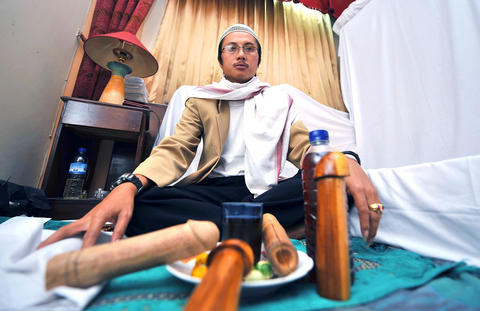Three large wooden penises lie on a colorful batik prayer mat in the house of Mak Erot, Indonesia's legendary lengthener of male members, inviting customers to pick their new look.
Mak Erot, the undisputed national expert in solving the self-image problems of Indonesian men, seems to have disappeared a long time ago but many believe she is still working her magic, perhaps from beyond the grave.
The craggy, betel nut-chewing woman with a distinctive brown birthmark on her cheek has spawned legions of imitators, while her legitimate heirs are keen to keep up the facade that she's alive lest business die with her.

PHOTO :AP
And it is a booming business - as a glance at the classified pages of any Indonesian tabloid newspaper will attest, packed as they are with ads for "penile paranormals" all claiming to have been trained by Mak Erot.
Jakarta, the nation's capital, even has a Mak Erot "clinic."
She has made it into popular culture too, with the film Extra Large: Between Me, You and Mak Erot currently playing in cinemas.
Mak Erot's village of Caringin is at the end of a road that winds along the Indian Ocean coast in southwestern Java. Her white house sits in a region where farmers from Indonesia's Sundanese culture incorporate their ancient animistic beliefs with Islam.
As expected, the disciples at Mak Erot's house say she's still alive.
"Mak Erot went to open an office in Medan (North Sumatra)," says a young man wearing a traditional Muslim beanie. "She's in a good shape. She still can walk."
He introduces himself as Haji Baban, Mak Erot's grandson, an heir of the old woman's esoteric powers and expertise in rare plants.
"People from all over the world come here, from Arab countries, from China, Singapore, Korea, Malaysia, Taiwan," he says.
"They want solutions to impotence or premature ejaculation, they ask to have a longer penis."
According to the daily Kompas, Mak Erot passed on her "science" to her five children and sixteen grandchildren who account for her 21 true heirs, a select order of masters of male enhancement.
A consultation with Haji Baban is an encounter with the arcane. Sitting cross-legged in semi-darkness, the patient is asked to detail his wishes with the visual aid of a selection of carved wooden phalluses.
Then comes the diagnosis, delivered after a contemplative silence.
Solemnly, Haji Baban intones that the client's appendage is "fairly average," and offers to conjure up a 6cm extension.
The prescription for such whopping growth is a 10-day course of eating and drinking mystery concoctions and secret potions, with the first dose of bitter berries to be taken immediately, washed down with dark brown liquid.
An assistant then brings a phallus shaped bamboo tube containing a roll of sticky coconut rice that has to be swallowed whole to avoid what Haji Baban describes ominously as "terrible genital consequences."
Haji Baban ends the consultation with a vegetable oil that the client must promise to apply daily with a specific hand action from base to tip. And no eating green bananas or citronella, he orders.
The daily cost for treatment is between US$70 and US$100, depending on the options selected.
This is a hefty sum for many in Indonesia but the imposing mansions being built around Caringin seem to indicate that plenty of men are willing to pay.
A local motorcycle taxi driver gestures to the newly built homes and says: "They belong to Mak Erot."

Towering high above Taiwan’s capital city at 508 meters, Taipei 101 dominates the skyline. The earthquake-proof skyscraper of steel and glass has captured the imagination of professional rock climber Alex Honnold for more than a decade. Tomorrow morning, he will climb it in his signature free solo style — without ropes or protective equipment. And Netflix will broadcast it — live. The event’s announcement has drawn both excitement and trepidation, as well as some concerns over the ethical implications of attempting such a high-risk endeavor on live broadcast. Many have questioned Honnold’s desire to continues his free-solo climbs now that he’s a

Francis William White, an Englishman who late in the 1860s served as Commissioner of the Imperial Customs Service in Tainan, published the tale of a jaunt he took one winter in 1868: A visit to the interior of south Formosa (1870). White’s journey took him into the mountains, where he mused on the difficult terrain and the ease with which his little group could be ambushed in the crags and dense vegetation. At one point he stays at the house of a local near a stream on the border of indigenous territory: “Their matchlocks, which were kept in excellent order,

Jan. 19 to Jan. 25 In 1933, an all-star team of musicians and lyricists began shaping a new sound. The person who brought them together was Chen Chun-yu (陳君玉), head of Columbia Records’ arts department. Tasked with creating Taiwanese “pop music,” they released hit after hit that year, with Chen contributing lyrics to several of the songs himself. Many figures from that group, including composer Teng Yu-hsien (鄧雨賢), vocalist Chun-chun (純純, Sun-sun in Taiwanese) and lyricist Lee Lin-chiu (李臨秋) remain well-known today, particularly for the famous classic Longing for the Spring Breeze (望春風). Chen, however, is not a name

Lines between cop and criminal get murky in Joe Carnahan’s The Rip, a crime thriller set across one foggy Miami night, starring Matt Damon and Ben Affleck. Damon and Affleck, of course, are so closely associated with Boston — most recently they produced the 2024 heist movie The Instigators there — that a detour to South Florida puts them, a little awkwardly, in an entirely different movie landscape. This is Miami Vice territory or Elmore Leonard Land, not Southie or The Town. In The Rip, they play Miami narcotics officers who come upon a cartel stash house that Lt. Dane Dumars (Damon)